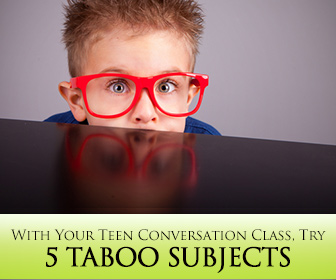Make Them Want to Write: 6 Journaling Activities That Teens Will Love


These universal teen traits often make the ESL conversation instructor’s normal tricks useless. What topics keep them interested and break the barriers? A strategy is to work with the rebellion/burgeoning independence, “badness”, need for peer acceptance, and curiosity that come with the age. Try presenting some of these “taboo” conversation questions in class.
For this to work, the ESL instructor needs to first establish trust and a sense of camaraderie that gets them to share. Put the questions, or similar ones related to the categories, on little cards and pass them out. Have the students sit in a circle and read their questions and begin the conversation topics one by one. If they do not respond naturally, introduce an example, preferably something personal, even if you are inventing it! If they still do not respond, poll them to begin and offshoot questions from the poll results.

They all lie and most have cheated on a test and feel better when they hear about someone else that has done the same. Two conversation starter questions are:
If they do not respond right away, tell them you cheated on your algebra test in ninth grade because you could not memorize the equations! They will relate. If that still does not work, ask the question as a poll. This is a good way to get the class started with gradual sharing.
Then pick on a few with their hands raised and ask which subjects. This will definitely open up a conversation that engages them about which subjects are hard to study! Polling works for any of these subjects.
We have all treated our little brother poorly and felt bad later, especially at this moody age. Usually we do not apologize and try to forget about it, but it feels good to admit the transgression and can be very humorous when we talk about it.
This focuses on past tense and is great for practicing feelings vocabulary. A starter example is “I ate the piece of cake my brother put in the refrigerator. I felt bad when he told me he brought it home for my grandmother.”
Ask them about paranormal experiences and occult beliefs. Teens of this age are trying to cope with identifying with beliefs and faiths and like talking about and exploring different ideas. Ghosts and the paranormal is lighter subject matter than God existing or heavy religious banter, however, and usually are very engaging subjects for teens. At minimum, you will get one or two students to tell stories to which everyone will listen. They are curious what their peers believe. TheTwilight series, horror movies, and other occult films all are marketed to teens for a reason!
This practices storytelling, as well as past, present, and future tense. It will bring up some good new vocabulary for the students as well!
They all have secret crushes at this age and like to pester each other about it. If you want to keep the conversation light, focus on pop stars/athletes. If the students know each other better, you could ask a general question about the perfect boy/girlfriend. These questions will practice traits vocabulary, “if I could” conditional, and can create additional conversations about sports, music, and TV.
All teens feel awkward in their bodies, and, with constant Facebook and media exposure globally, they compare themselves to famous people and wish they could look different somehow! This is a very funny conversation topic for students of this age if you keep it light – focus on who they think is most beautiful and why instead of making it too personal. This subject will practice describing people, present and conditional tenses, and will end up being a good vocabulary lesson.
You will find that not only will they participate, but they will also listen. Furthermore, your students will be begging for the new vocabulary to communicate their thoughts. We have to try to relate on the level of our students if we want them to learn how to communicate, so have fun doing so and be a teen again with them!